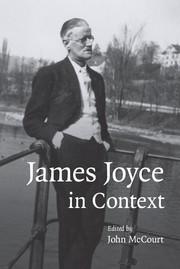Book contents
- Frontmatter
- Contents
- Notes on contributors
- Preface
- List of abbreviations
- PART I LIFE AND WORKS
- PART II THEORY AND CRITICAL RECEPTION
- 4 Genre, place and value: Joyce's reception, 1904–1941
- 5 Post-war Joyce
- 6 Structuralism, deconstruction, post-structuralism
- 7 Gender and sexuality
- 8 Psychoanalysis
- 9 Post-colonialism
- 10 Genetic Joyce criticism
- 11 Translation
- 12 Joyce and world literature
- 13 Twenty-first-century critical contexts
- PART III HISTORICAL AND CULTURAL CONTEXTS
- Further reading
- Index
11 - Translation
Published online by Cambridge University Press: 14 July 2009
- Frontmatter
- Contents
- Notes on contributors
- Preface
- List of abbreviations
- PART I LIFE AND WORKS
- PART II THEORY AND CRITICAL RECEPTION
- 4 Genre, place and value: Joyce's reception, 1904–1941
- 5 Post-war Joyce
- 6 Structuralism, deconstruction, post-structuralism
- 7 Gender and sexuality
- 8 Psychoanalysis
- 9 Post-colonialism
- 10 Genetic Joyce criticism
- 11 Translation
- 12 Joyce and world literature
- 13 Twenty-first-century critical contexts
- PART III HISTORICAL AND CULTURAL CONTEXTS
- Further reading
- Index
Summary
‘Latin me that, my trinity scholard.’
(FW 215, 26)When I first saw the entry ‘vulgar language’ in Clongowes Wood College's Punishment Book, I was bemused by the offence and I remember thinking that, by forgoing the standard language, little Jim Joyce had just committed his first official act of intralingual translation. We cannot know what word(s) he used, though Father Bruce Bradley suggests that ‘it is possible to speculate about the vulgarity uttered by the seven-year-old James Joyce’ based on ‘Christopher Roche's punishment earlier that year … for calling a boy a vulgar name “stink”’. Stephen thinks of Rody Kickam as a nice fellow but ‘nasty Roche was a stink’ (P 4); he grapples with ‘stink’ as he does with ‘suck,’ ‘kiss’, ‘belt’ or God/Dieu. We see a novice translator unwittingly performing metempsychotic translations by considering, separately, words as the verbal ‘bodies’ in search of their ‘souls’ or meanings. Skeat in hand, young Joyce, auto-languaged into college Stephen, wades through words ‘so familiar and so foreign’ (P 205), breaking away from the confines of English into the sophistication of multilinguisticity: ‘ivory, ivoire, avorio, ebur’ (P 193). When we first meet Bloom, he too performs a series of metempsychotic translations during his morning conversation with Molly in Calypso, a process he continues throughout the day. Languaging, wording, punning and riddling are at the heart of Joyce's artistic endeavour from the start when, as a novice poet of nine, he gave his first poem a Latin title ‘Et Tu, Healy’.
- Type
- Chapter
- Information
- James Joyce in Context , pp. 125 - 136Publisher: Cambridge University PressPrint publication year: 2009
- 3
- Cited by

